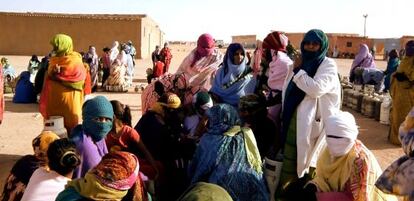Javier Bardem’s film for a forgotten people
Just premiered at Berlin, ‘Hijos de las nubes’ tells the story of the Sahrawis

“The fact we are Spaniards, and knowing and seeing what our country did in the past — and continues to avoid doing in the present — in relation to the rights and freedom of these people means the experience left a very profound mark… It’s not so much a feeling of guilt as one of historical responsibility.”
Javier Bardem visited the Sahara nearly four years ago and it changed his life. Since that trip — during which he shared the family tent of Hafda, a five-year-old girl who referred to him as “the fat guy who snores” — the Spanish actor has thrown himself into the struggle for the rights of the Sahrawi people, who have been abandoned by the international community.
Having created the platform Todos con el Sáhara and addressed the United Nations to advocate self-determination for Western Sahara, Bardem’s latest act of support goes by the name of Hijos de las nubes (or, Children of the clouds), a documentary that he has produced and nurtured (it’s his second work as a producer after Invisibles in 2007). The movie premiered at the Berlin Film Festival on Thursday.
“It’s a real honor and privilege to be able to premiere in Berlin. Hopefully it will help this documentary to have a longer life, and more people will be able to acquaint themselves with the reality of the Sahrawis through the film,” says the actor via email, a few days before landing in the German capital.
He was set to present the film alongside its director, Álvaro Longoria, who has been his comrade-in-arms throughout his discovery of the Sahara tragedy ever since they shared the same tent on that initial voyage.
The documentary — which has a decidedly didactic tone, with dates and figures spread throughout its 90-minute duration — introduces the history of the Sahrawi people. It’s a difficult objective, considering the amount of economic and international geostrategic interests, all of which, says Longoria, impede a solution to this 35-year-old problem.
“Our intention was to accompany the viewer on the same journey that we set out on four years ago, as we discovered a reality of which we were not fully aware,” he says.
Politicians, historians, journalists and scholars from all different nations and international organizations march through Hijos de las nubes, despite the fact that, over four years of preparation, they encountered strong opposition from many of those involved. Representatives of France, Algeria, the United States, Spain, the United Nations and Amnesty International, as well as Sahrawis such as the activist Aminatou Haidar, all make their thoughts public in the film. One significant absence, though — which Longoria sees as the failure of the documentary — is that of the Moroccan government, which refused to take part.
Ex-Prime Minister Felipe González is one of the Spanish contributors, although other politicians rejected the offer to participate, including former Socialist minister and NATO secretary general Javier Solana, ex-Prime Minister José María Aznar and former foreign minister in the government of José Luis Rodríguez Zapatero, Miguel Ángel Moratinos, who called off a meeting with Bardem one hour before their agreed time.
The actor isn’t overly optimistic about the future of the Sahrawis. “A documentary is not going to bring about big changes,” he says. “We only want the situation, the causes and the different outlooks for the present and the future to be understood a little better,” he explains.
“I hope we get a solution before a more dramatic end takes place.”
Tu suscripción se está usando en otro dispositivo
¿Quieres añadir otro usuario a tu suscripción?
Si continúas leyendo en este dispositivo, no se podrá leer en el otro.
FlechaTu suscripción se está usando en otro dispositivo y solo puedes acceder a EL PAÍS desde un dispositivo a la vez.
Si quieres compartir tu cuenta, cambia tu suscripción a la modalidad Premium, así podrás añadir otro usuario. Cada uno accederá con su propia cuenta de email, lo que os permitirá personalizar vuestra experiencia en EL PAÍS.
¿Tienes una suscripción de empresa? Accede aquí para contratar más cuentas.
En el caso de no saber quién está usando tu cuenta, te recomendamos cambiar tu contraseña aquí.
Si decides continuar compartiendo tu cuenta, este mensaje se mostrará en tu dispositivo y en el de la otra persona que está usando tu cuenta de forma indefinida, afectando a tu experiencia de lectura. Puedes consultar aquí los términos y condiciones de la suscripción digital.









































